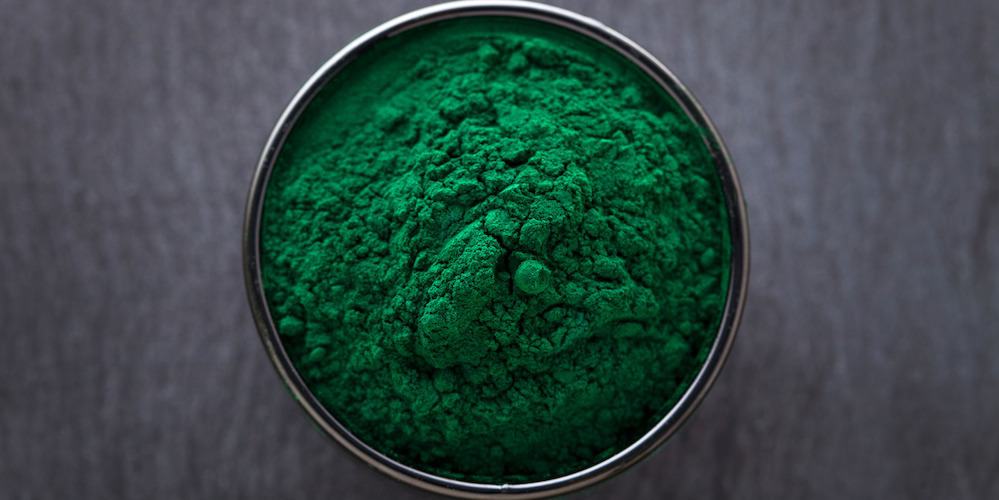BENEFITS OF SPIRULINA
✓ Highly nutritious and recommended for vegetarians
✓ Anti-fatigue and improves athletic performance
✓ Boosts the immune system
✓ Natural source of antioxidants
✓ Potential anti-cancer properties
What is spirulina?
Appearing 3.5 billion years ago, spirulina (Arthrospira platensis) is one of the first forms of life on earth. Often referred to as an algae (or micro-algae), it is actually a group of cyanobacteria, bacteria capable of photosynthesis – hence its blue-green color. Under the microscope, these bacteria less than one millimeter long appear as a spiral – hence its name!
It naturally develops in fresh and alkaline water lakes of tropical regions, historically in Lake Chad and Lake Texcoco in Mexico. There, the Aztecs, a pre-Columbian civilization from the 12th to the 16th century, already made small super-energetic cakes from it!

Today, spirulina is consumed and cultivated on all continents. Its relatively eco-friendly cultivation can be done in artificial ponds, requiring little water and space. France is a leader in this field, with spirulina farmers found in almost every region. As a superfood par excellence, it is also becoming a topic of innovation for various food tech startups and is present in numerous dietary supplements.
Read also In Bangkok, discover a startup growing spirulina on rooftops
In 2005, the WHO recognized its high nutritional value, ease of cultivation, and low energy impact, making it a major ally against malnutrition. The UN and NGOs, including the Red Cross, are developing food relief missions based on this food. But the benefits of spirulina also interest NASA, which has included it in astronauts’ menus, and the European Space Agency, which plans to grow it on Mars!
Why such enthusiasm? Spirulina is very low in calories, and it’s one of the most nutrient-rich foods known. Notably, it can contain up to 70% protein, about three times more than meat!
And since spirulina lacks cell walls, its proteins are highly digestible, at 95%. Along with proteins, it’s probably its very high iron content that makes it suitable for vegetarian and vegan diets.
Finally, it’s highly valued by athletes and people wishing to increase muscle mass. They quickly see their muscles strengthened when taking a spirulina supplement.
Lire aussi l Nos conseils pour acheter de la spiruline
Composition of spirulina

- Proteins
- 18 amino acids (including all 8 essential)
- Vitamins: B1, B2, B3, B5, B6, B7, B8, B9, pseudo-vitamin B12, E, K
- Minerals and trace elements: calcium, phosphorus, magnesium, iron, zinc, potassium, copper, chromium, manganese, sodium, selenium
- Essential fatty acid: gamma-linolenic acid
- Antioxidant pigments: chlorophyll, phycocyanin, carotenoids (including provitamin A beta-carotene)
Benefits of spirulina

Spirulina boasts numerous virtues: it’s very rich in proteins and also contains many vitamins and minerals. It helps boost athletic performance, is anti-fatigue, and strengthens the immune system.
The phycocyanin it contains, its blue-green pigment, is a powerful antioxidant that helps combat aging by fighting free radicals.
In this article, you will discover the complete list of spirulina’s benefits, as well as serious scientific studies supporting its health benefits.
How to consume spirulina

Spirulina comes in many forms: powder, flakes, capsules, and even fresh. In powder or flake form, it is suitable for cooking and can be easily integrated into your diet. Ideally, it is consumed fresh: its taste is incomparable, and its benefits are fully preserved!
In capsules or tablets, spirulina is more suited for a cure logic: some people dislike its iodized taste, so dietary supplements are a good format to enjoy its benefits.
Our article will tell you everything about the different ways to consume spirulina and its taste.
Spirulina, an exceptional source of iron

Spirulina contains 28.5 mg of iron per 100 g, making it one of the richest sources. Moreover, this type of iron is said to be highly absorbable by the human body. Remember to consume vitamin C alongside, which would optimize the absorption of iron by the small intestine.
Thus, it can be useful for people with iron deficiency (iron deficiency anemia) and for vegetarians, vegans, and vegans whose intake is limited due to the absence of meat in their diet.
Find in our dedicated article our advice for optimizing your iron intake with spirulina.
Phycocyanin

Phycocyanin is the blue-green pigment that gives spirulina its lovely color. It is a powerful antioxidant that helps our cells fight free radicals and combat aging. Some studies also show its anti-inflammatory, anti-diabetes properties, and benefits on the microbiota and liver.
To enjoy its benefits, you can consume spirulina as is, or use dietary supplements containing only phycocyanin.
Discover all its benefits and our usage tips in our dedicated article.
The benefits of spirulina for hair

Spirulina is a prime beauty ally for your hair: the iron it contains helps the body produce keratin, the primary material of hair. Additionally, B vitamins, vitamin A, and zinc are particularly beneficial for the strength and growth of hair.
To do a spirulina cure to boost hair health, you can use it internally (dietary supplements), or externally by preparing hair masks with fresh or powdered spirulina.
Find our tips and hair mask recipes with spirulina in our article.
Organic spirulina

Given current European regulations and the necessity of certain inputs like mineral nitrogen, it is almost impossible today for French spirulina producers to certify their production as organic.
Yet, we see organic spirulinas in stores and online: they almost always come from abroad, from countries with different rules than the European Union. This is, therefore, an important issue for small French producers, who are working – through the Federation of French Spirulina Producers – to change the rules.
Discover all the issues of organic spirulina in our article.
History and culture of spirulina

Spirulina naturally grows in lakes, notably in Chad, where it has been harvested for over 1000 years. It was only in the 1960s that the West discovered the nutritional benefits of this cyanobacteria and began to cultivate it outside of its original environment.
Today there are more than 150 French spirulina producers, who cultivate it in greenhouses with very little water and inputs. The cultivation of spirulina is indeed particularly ecological, especially when compared with the production of animal proteins.
Read our article on spirulina cultivation to learn more.
Expert Opinion
Spirulina is an exceptional source of nutrients. Its high protein, iron, vitamin, and mineral content makes it particularly suitable as a supplement to an already well-balanced diet.
Indeed, a superfood, however rich it may be, cannot alone compensate for a poorly adapted diet! This is particularly true for spirulina, of which we consume limited quantities: about 5 grams per day.
In nutrition, “more” is not necessarily “better”!
💡Proteins: Very rich in proteins, spirulina is a great complement to plant-based diets, especially those mainly raw. However, people who regularly consume animal products (meat, dairy products) often eat too much protein. Thus, spirulina may be less useful for them, but it remains very interesting for the other nutrients it contains.
💡Iron: Consuming foods rich in vitamin C (citrus fruits, cabbages, peppers, parsley, but also camu camu, acerola or even goji berries, etc.) helps the absorption of iron contained in spirulina. Be careful not to exceed the recommended doses of spirulina, especially in the absence of iron deficiency!
💡Plant-based diet and vitamin B12: It is known that supplementation is essential when you are vegan. Spirulina should then be consumed away from the intake of vitamin B12. Indeed, it can hinder its absorption. For example, if taking B12 daily as a dietary supplement, take spirulina in the morning, and B12 in the evening.
Perrine Bellanger – dietitian nutritionist
Sources and scientific studies
Kalafati M, Jamurtas AZ, Nikolaidis MG, Paschalis V, Theodorou AA, Sakellariou GK, Koutedakis Y, Kouretas D, 2010. Ergogenic and antioxidant effects of spirulina supplementation in humans.
Lu HK, Hsieh CC, Hsu JJ, Yang YK, Chou HN, 2006. Preventive effects of Spirulina platensis on skeletal muscle damage under exercise-induced oxidative stress.
Selmi C, Leung PS, Fischer L, German B, Yang CY, Kenny TP, Cysewski GR, Gershwin ME, 2011. The effects of Spirulina on anemia and immune function in senior citizens.
Romay Ch, González R, Ledón N, Remirez D, Rimbau V, 2003. C-phycocyanin: a biliprotein with antioxidant, anti-inflammatory and neuroprotective effects.
Mathew B, Sankaranarayanan R, Nair PP, Varghese C, Somanathan T, Amma BP, Amma NS, Nair MK, 1995. Evaluation of chemoprevention of oral cancer with Spirulina fusiformis.
Park HJ, Lee YJ, Ryu HK, Kim MH, Chung HW, Kim WY, 2008. A randomized double-blind, placebo-controlled study to establish the effects of spirulina in elderly Koreans.
Cingi C, Conk-Dalay M, Cakli H, Bal C, 2008. The effects of spirulina on allergic rhinitis.
Khan Z, Bhadouria P, Bisen PS. Nutritional and therapeutic potential of Spirulina. Curr Pharm Biotechnol. 2005 Oct;6(5):373-9.
Natural Standard (Ed). Herbs & Supplements – Spirulina, Nature Medicine Quality Standard.
Ripley D. Fox. Pioneer in Production of Spirulina for Combatting Malnutrition.
The Natural Pharmacist (Ed). Natural Products Encyclopedia, Herbs & Supplements – Spirulina, ConsumerLab.com.
CIQUAL



